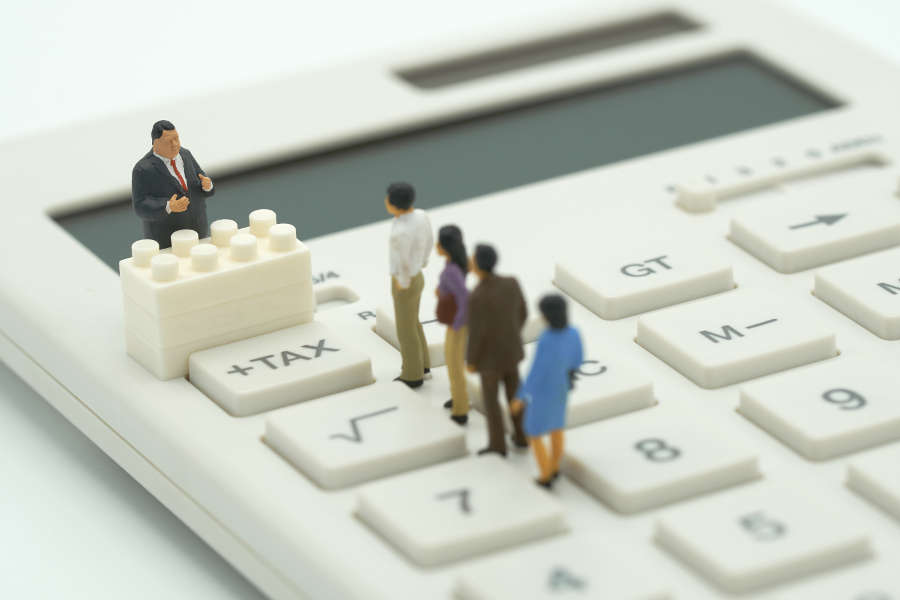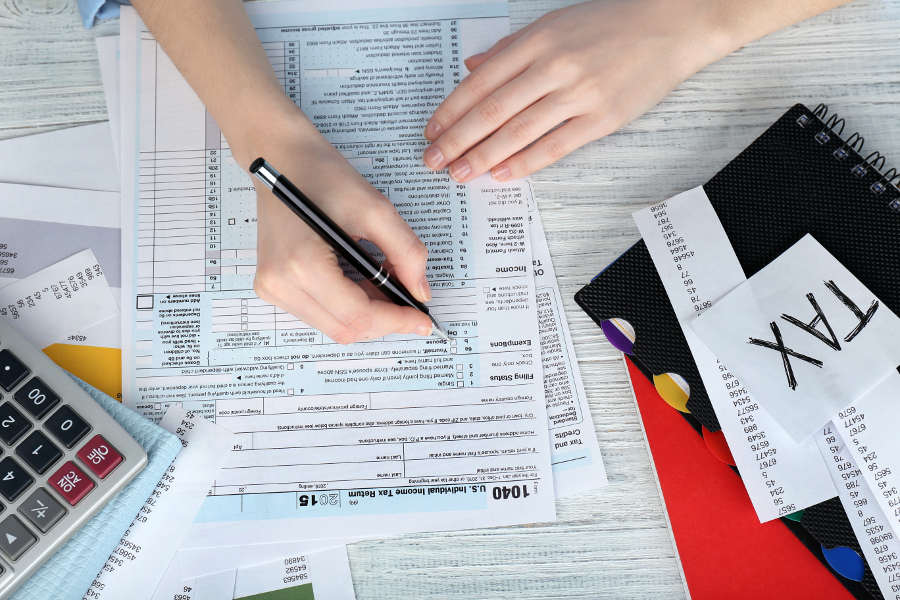I WANT
RELATED LINKS
I WANT
RELATED LINKS
RELATES LINKS
I WANT
RELATES LINKS
Services
Related Links

คำค้นหาที่แนะนำ
ผลการค้นหา "{{keyword}}" ไม่ปรากฎแต่อย่างใด
ข้อแนะนำในการค้นหา
- ตรวจสอบความถูกต้องของข้อความ
- ตรวจสอบภาษาที่ใช้ในการพิมพ์
- เปลี่ยนคำใหม่ กรณีไม่พบผลการค้นหา
Use and Management of Cookies
We use cookies and other similar technologies on our website to enhance your browsing experience. For more information, please visit our Cookies Notice.
- Personal Banking
- Stories & Tips
- Salary Man
- How to Tax Planning with Final Tax for Maximum Benefits
- Personal Banking
- ...
- How to Tax Planning with Final Tax for Maximum Benefits
How to Tax Planning with Final Tax for Maximum Benefits
10-02-2020
Final Tax is an income that withholding tax has already been deducted. Individuals with income can choose to include or exclude it in the calculation of individual income tax that they will file at the end of the year.
Nowadays, there are 5 types of income that is Final Tax which are:
Types of Income | Section | Rate of Withholding Tax |
Interests (e.g. deposits, bonds, and debentures) | 40 (4) | 15% |
The variance between Call Price and Sell Price of Debt Securities | 40 (4) | 15% |
Capital Gain from Debt Securities | 40 (4) | 15% |
Dividend | 40 (4) | 10% |
Income from Selling of Immovable Properties (given as inheritance and not aiming for profit) | 40 (8) | Progressive Rate in which Department of Lands reduces Withholding Tax |

Therefore, an important strategy in tax planning is to understand what types of income you possess and what types of income that are entitled to Final Tax. This means that we can choose to include or exclude when filing personal income tax at the end of the year.
Compounding all types of income gained throughout the year to file individual income tax creates a risk of increasing income that exceeds the tax rate you usually pay. This is because the Thai tax rate is a progressive rate, which means the higher your income, the higher the tax rate you have to bear. For this reason, by cutting off the burden of tax paid along the year that Final Tax can be used, a complication in filing tax will be reduced and you might even get to pay lesser tax.
To get a clearer picture, let us proceed to the examples. Assuming you receive an income from your salary and bonus at 1 million baht per year. Along the way, you receive 10 000 baht from a fixed deposit interest and 2 million baht (with an estimated price of 2 million baht) from selling the townhouse that you lived for 10 years so that you can move to a new detached house in suburb area. How will your tax planning be?

Let us first have a look at different types of income and calculation of taxes.
Income from monthly salary and bonus is an income under Section 40(1), which is a progressive tax. The way to calculate tax is to assume that you purchase insurance with a value of 100 000 baht, you invest in RMF for 50 000 baht and pay for social security for 9000 baht.
| 1,000,000 baht |
| 100,000 baht |
| 60,000 baht |
| 100,000 baht |
| 9,000 baht |
| 50,000 baht |
Net Income | 681,000 baht |
Calculate progressive tax, referring to the table below:
Annual Net Income (baht) | Tax Rate | Net Income (baht) | Maximum Cumulative Tax (baht) |
0 – 150,000 | Exempted | 0 | 0 |
150,001 – 300,000 | 5% | 7,500 | 7,500 |
300,001 – 500,000 | 10% | 20,000 | 27,500 |
500,001 – 750,000 | 15% | 37,500 | 65,000 |
750,001 – 1,000,000 | 20% | 50,000 | 115,000 |
1,000,001 – 2,000,000 | 25% | 250,000 | 365,000 |
2,000,001 – 5,000,000 | 30% | 900,000 | 1,265,000 |
> 5,000,000 | 35% | ||
After all the calculations, you realize that you receive 681 000 baht of net income and thus, your tax rate is at 15%
- 10 000 baht of income from fixed deposit interest (Section 40 (4)) will receive a 15% withholding tax. You are aware that the withholding tax and tax rate are equal at 15% and therefore, Final Tax will now be used.
- Income from selling real estate without aiming for profit (Section 40(8)) has a method of calculating withholding tax by using estimated price, deducted by expenses according to holding period as following:
Holding Period (years) | 1 | 2 | 3 | 4 | 5 | 6 | 7 | More than 8 ปี |
Deductible Expenses (%) | 92 | 84 | 77 | 71 | 65 | 60 | 55 | 50 |
If the real property is passed down as an inheritance or given as a gift, there will be a 50% deductible expenses
- From an example, the estimated price is 2,000,000 baht
- Deduction of Expenses according to the holding period (> 8 years = 50%) 1,000,000 baht
- Income after minus expenses 1,000,000 baht
- Average annual income (income after minus expenses and divided by the holding period) 100,000 baht
- Average annual income tax (0-300 000* with 5% tax) 5,000 baht
- Withholding tax (average annual income tax X holding period) 50 000 baht
- Tracing back to the initial amount of 2 000 000 baht, you will only have to pay 2.5% tax. Thus, Final Tax should be used as it will increase your salary base after compounded into an income to file annual income tax and you will pay a higher progressive tax.
*Tax calculation from real property will calculate with reference to progressive rate and those who receive the first 0 – 150 000 baht will not be exempted.

Despite having 3 types of income, which are income from a regular job, income from deposit interest and income from selling of real estate, you can choose not to include income from deposit interest and income from selling of real estate without aiming for profit as parts of your income to file annual tax. This is because there are very high chances that you have to pay tax at a higher rate.
So, which types of income should be included for filing annual tax payment then? In case you do not have any income at all throughout the year and only gain about 300 000 baht from interest. After the deduction of 15% Final Tax, you will immediately have to pay 45 000 baht.
However, if this amount of income is used to calculate year-end personal income by using P.N.D.90, this can deduct 0 baht expenses (no deduction for interest), deduct 60 000 baht of the personal exemption, there will be 240 000 baht as a remaining, calculating tax according to progressive rate with the first 150 000 baht being exempted. Also, when the excess 90 000 baht is taken to calculate a 5% tax, it will be equivalent to filing 4500 baht of tax.
Therefore, you can claim for 40 500 baht of the tax refund. If you have no idea about this principle and allow yourself to be deducted 45 000 baht of tax, you will not get to enjoy 40 500 baht of the tax refund.
Therefore, you can claim for 40 500 baht of the tax refund. If you have no idea about this principle and allow yourself to be deducted 45 000 baht of tax, you will not get to enjoy 40 500 baht of the tax refund.
All in all, any individuals with income can manage their taxes and pay lesser taxes legally. There are 3 factors that have to be taken into consideration namely are types of taxable income, income that can pay tax upon receiving without including year-end and exempted income that does not have to be included in the form. By just knowing all these, you are now able to manage taxes effectively.
By Nipapan Poonsathianrasap CFP, Independent Financial Advisor, Writer and Lecturer.